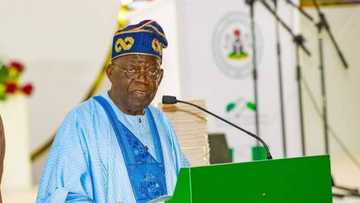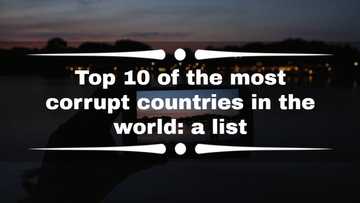What are the main features of democracy? A comprehensive guide
Democracy, a form of governance where power resides with the people, is the most widely embraced form of governance worldwide. It is rooted in freedom, public accountability, and the rule of law. It empowers citizens of a country to participate in popular sovereignty and decision-making through free and fair elections. What, then, are the main features of democracy? Here is a comprehensive guide to democracy.

Source: UGC
Democracy is a broad and diverse political idea, and countries typically adopt hybrid systems that suit their unique contexts. There are, however, key fundamental elements that define democracy as a system of government.
The main features of democracy
What is democracy? Democracy, derived from the Greek words “Demos” (meaning "people") and “Kratos” (meaning "rule"), refers to the system of governance that empowers its citizens to equally contribute and participate in the collective decision-making towards the outcome of its processes.
As first defined by Aristotle, democracy is when the indigent, and not the men of property, are the rulers. This implies that power and the final decision-making rests with the people.
A democratic country promotes individual freedoms, protects human rights, and adheres to the provision of checks and balances to avert abuse of power by its leaders. Because power rests with the people, a democracy allows its citizens to hold leaders accountable, which, in turn, ensures a more responsive and just government.
What are the main features of democracy?

Source: UGC
Democracy is one of the most significant concepts that has reigned for centuries in world politics. At its core, the voice of the people must be louder, and it is the basis through which a government is facilitated. Here are the main features of democracy.
1. Protection of human rights and freedoms
Among others, individual rights are a fundamental feature of democracy. A democracy guarantees citizens certain fundamental rights, including the freedom of speech, expression, assembly, and religion. That means that citizens can freely and publicly express their opinions on a wide range of political issues (including criticizing the government) without fear of punishment.
A democracy protects individuals’ civil liberties, guarantees due process of the law, and allows everyone to formulate independent decisions at their discretion. However, those ideas must be within the constraints of the law and should not pose a threat to fellow citizens.
2. Popular sovereignty
At its core, democracy emphasizes popular sovereignty, which means that political authority and power are derived from and accountable to the people. As such, a democratic country will allow citizens to exercise their power by voting to elect their leaders or representatives and to freely participate in public debates. The will of the majority, therefore, prevails in shaping major policies.
3. The rule of law
One of the key features of democracy is the rule of law. All democracies have a legal framework that safeguards against impunity by upholding the law and protecting the rights of the citizenry. As such, all individuals, including those in power, are subject to and must abide by the law.
4. Political pluralism and tolerance
Democracy thrives on the idea of political pluralism, which means that the available frameworks must recognize the need for diverse opinions and foster multi-party political systems. The idea of pluralism forms the basis for healthy competition, ensuring that individuals with varying ideologies and political interests can freely associate with groups that best represent their aspirations but still coexist.
5. Regular, free, and fair elections
No democracy will exist without the concept of regular, free, and fair elections. It is at the heart of all democratic processes and allows citizens the “one man, one vote” right to choose and hold their leaders accountable. This right is typically exercised via a transparent, inclusive, and open electoral system to allow all citizens the opportunity to actively shape the political landscape.
6. Freedom of the press and access to information
A country is considered democratic if there is press freedom and its citizenry enjoys independent sources of information. A vibrant independent media acts as the watchdog that can expose corruption or abuse of power by those in key positions.
By doing so, the press will disseminate diverse information (which is not under the control of the government) to the people and enable them to make informed decisions.
Types of democracy

Source: UGC
The two main types of democracy include direct and representative. However, other variants with unique characteristics exist in the present society, and their features can vary significantly from one democratic country to another. Below are some of the main types of democracy:
1. Direct democracy
In a direct democracy, citizens directly participate in the decision-making process, typically conducted at the local or community level. As opposed to electing representatives, citizens vote on key policies and legislation by themselves.
2. Representative democracy
Also referred to as indirect democracy, representative democracy is a form of democracy in which citizens choose leaders to make decisions on their behalf. In this system, the elected representatives form a governing chamber – such as Congress or Parliament – where they debate and pass laws on important matters.
3. Parliamentary democracy
In a parliamentary democracy, the executive branch of government is accountable to the legislature, usually the parliament. The head of government, typically the prime minister, is elected by a parliamentary majority.
4. Presidential democracy
A presidential democracy features a separation of powers between the legislative and the executive branch. The president, who is elected directly by the people, acts as the chief executive but is not accountable to the legislature.
5. Hybrid democracy
A hybrid democracy combines features of governance from both the parliamentary and the presidential systems. The president is typically the head of government but works in close cooperation with the parliament and prime minister.
6. Constitutional democracy
A constitutional democracy is a system in which the constitution outlines the powers and limitations of the executive, the rights and freedoms of citizens, and acts as the supreme law that all branches of government must abide by. Nigeria, Kenya, and Ghana, among others, are examples of democracies that are based on this system.
6. Liberal democracy
Liberal democracy is characterized by all key fundamental features of democracy but with an emphasis on the rights and liberties of the individual. Beyond holding free and fair elections, liberal democracy has an independent and robust judiciary that prioritizes freedoms of speech, press, and assembly, among others.
What are the benefits of democracy?

Source: UGC
Democracy is the most popular political concept globally, and for a reason. It offers numerous benefits that are central to the well-being and progress of societies. Here are some of the key benefits of democracy.
- A democracy fosters political participation and representation – including that of minorities – which promotes accountability in governance.
- Protects individual rights and freedoms.
- A democracy ensures the rule of law and accountability and that laws apply equally.
- In a democratic society, the constitution provides avenues for debate, negotiations, or compromises, enabling peaceful conflict resolution.
- A democratic system fosters social stability and cohesion through open and transparent avenues, which are key factors that promote economic prosperity and development.
What are the characteristics of democracy?
Democracy is characterized by free and fair elections, protection of rights and civil liberties, separation of powers, rule of law, public accountability, and freedoms of speech and press.
What are the types of democracy?
The main types of democracy include direct and representative. However, other iterations do exist in present society and include constitutional, parliamentary, presidential, liberal, and hybrid democracies.
How did Abraham Lincoln define democracy?
In his Gettysburg Address in 1863, Abraham Lincoln defined democracy as a "government of the people, by the people, and for the people."
What are the arguments for democracy?
Proponents of democracy say that it promotes individual freedoms, protects human rights, and provides frameworks for accountability, thereby ensuring social cohesion and economic growth.
Democracy is a system of governance in which the rulers of a state are elected by the people. At its core, the voice of the people must prevail. Other features of democracy include adherence to the rule of law, popular sovereignty, and protection of individual rights and civil liberties.
Legit.ng explained the causes of insecurity in Nigeria. Insecurity slows down Nigeria's growth and development. It is pretty challenging for the public and the government to get a lasting solution to this problem.
Nigeria's primary sources of insecurity are tribal conflict, poverty, diseases, bad governance and human rights abuse.
Source: Legit.ng










